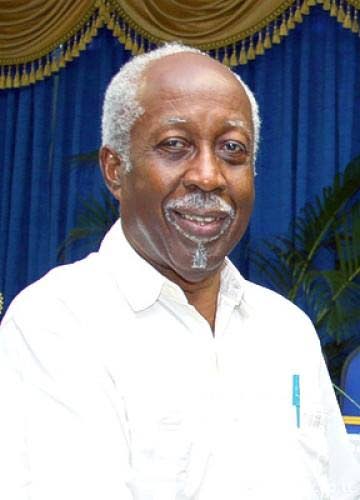Walking on eggshells

Reginald Dumas
THE VISIT of a British warship to Guyana at the end of last December surprised me. Why? Because I thought the visit wasn’t in harmony with one of what I regard as the two most important elements of the previous Argyle Declaration. That element is the undertaking by Guyana and Venezuela not to “threaten or use force against one another in any circumstances.” (The other most important element, in my opinion, is that discussions between the two would continue.)
Barely two weeks after Argyle, the HMS Trent, a warship of a Guyana ally, Britain, arrived in Guyana, perhaps traversing waters Venezuela sees as its territory. Did the presence of such a ship, in disputed waters, reflect an atmosphere of peace with no threat of force?
Did the Guyanese and the British consider how the Venezuelans might react? Especially after Argyle, was great care in one’s words and actions not absolutely necessary? In an environment as tense and fragile as what we have? And made more uncertain by Nicolás Maduro’s clear detestation of the British?
They must have, because they sought to downplay the military aspect of the visit. The ship, they said, was only an offshore patrol vessel and would simply be conducting training exercises with the Guyanese (training for what, I wonder); it was generally used to intercept pirates (pirates! Are the Somalis in town?) and drug smugglers, etc. The visit had already been arranged (and couldn’t be cancelled, I suppose). It was all a matter of Guyanese internal security, having nothing to do with Venezuela.
The Venezuelans were unimpressed. Their reaction was, to me, unsurprising: instant rage. They called for the immediate withdrawal of the ship, deeming its presence “a provocation affecting the resolution of the Essequibo controversy.” They charged that there was synchronisation between Britain and the US Southern Command which was “a direct threat to peace and stability in the region.”
Caracas also urged Georgetown “to refrain from continuing to involve military powers in the territorial controversy,” and warned Caricom and the Community of Latin American and Caribbean States (CELAC) that the UK/Guyana action ran counter to the spirit of peace and understanding with which Venezuela had attended the Argyle meeting.
And it issued a not-too-veiled threat of its own: “The Bolivarian Republic of Venezuela reserves to itself all actions, within the framework of the Constitution and international law, to defend the maritime and territorial integrity of the homeland.”
To show he wasn’t bluffing, Maduro then announced that nearly 6,000 Venezuelan troops would conduct operations off Venezuela’s eastern coast near the border with Guyana. Defensive exercises, of course; not even a hint at the use of force. If you believe that…
Unsurprisingly also, Brazil, which had accepted a major role in Argyle, expressed alarm at the sabre-rattling, and appealed to the two protagonists to return to the fundamentals of the Argyle Declaration.
The Argyle talks had been facilitated (not mediated) by the Prime Minister of St Vincent and the Grenadines, Dr Ralph Gonsalves, who is also the interim chairman of CELAC. His role, together with that of the recent Caricom chairman, Roosevelt Skerrit of Dominica, is to continue; they and the Brazilian president, Lula da Silva, will carry on as what they diplomatically call “interlocutors.”
Given the firm positions of the two main actors, great vigilance and care are constantly needed. For instance, a photograph (taken at the Venezuelan Embassy in Kingstown more than one year ago) has surfaced of Gonsalves standing in apparent approval behind a map showing the contested Essequibo region as an integral part of Venezuela. “Innocent inadvertence,” Gonsalves has described this lapse, and I accept his word. But you see how careful and cautious you have to be. For example, receiving an honour or other benefit from one side could rouse suspicions on the other side.
Two more observations. First, it seems that not one of Venezuela’s friends/allies – Cuba, Nicaragua, China, Russia, Iran, Turkey – not a single one, has come out in public support of Venezuela’s position in this matter. Has that sent a message to Maduro?
Second, one of the companies drilling for oil in the contested region is Chinese, the state-owned China National Offshore Oil Corporation (CNOOC), working as a partner with US companies Hess (which has just been acquired by Chevron) and Exxon Mobil. Did Maduro realise, when he “instructed” foreign oil companies to leave the Essequibo within three months, that he was also offending China, a friend? And now India seems set to enter the picture.
In this very delicate situation, we have to emulate the careful playing of the late Miles Davis, the legendary jazz trumpeter: we must walk on eggshells.

Comments
"Walking on eggshells"